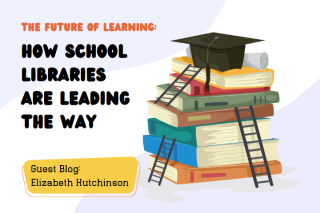- Your School Type
- Solutions
- Resources
- Blog
- Events
- More
- Contact Us
- Book a Demo
- Get a Quote

Guest Blog: Elizabeth Hutchinson is a renowned school library specialist with over 20 years of experience in the field. Elizabeth shares her thoughts on how AI is transforming education and the role of school librarians in this new technological landscape.
I have to admit that I wrote this blog a couple of days ago and was convinced that the arrival of AI was going to transform the world of school librarianship going forward in a very positive way. Then a conversation with a colleague changed my mind and I felt the need to re-write it. Why do I think it is important that you know this? As librarians, we need to be constantly learning and open to new ideas and opinions. It is important that we keep up to date but equally important that we don’t jump on the latest bandwagon without understanding the facts as we know them today. I realised that this is what I had done so with my new learning here is what I think about how school librarians and the future with AI.
Ultimately the world is changing very fast and it is impossible to keep up to date with every new AI tool out there. Education is getting very excited about how these tools are going to make teachers' lives easier and make mundane tasks quicker. If you are on social media you would think that every student is using it to write their essays and every teacher is creating their lesson plans and assessment quizzes. However, as much as it seems to be the main topic of conversation at the moment there is still time to reflect on how these tools are going to impact education and school libraries.
Having worked in and around school libraries for over 20 years, I have often seen the frustration that the lack of understanding of the role, has brought. Particularly in schools where exam-based assessments are the way forward. Many of these schools are teaching to the test so the opportunity for school librarians to get involved in teaching information literacy and inquiry skills are few and far between. I began to wonder if this type of testing would stop with the introduction of AI. If students are made to sit in a hall without internet access and could not use AI to help them, why would this need to change and how does this help school librarians going forward? Sadly I don’t think it does… for now.
I do believe that education will potentially need to change but as this is an unknown entity at the moment I think it is probably safer to talk about what we do know. The current age for anyone to sign up to ChatGPT is 13yrs but legally not under 18 without parental permission. This means that using it in school has real ethical implications. Along with the age limit you still have to sign up with an email address and phone number which is potentially a problem for student safety and currently should not be encouraged without a lot more thought about safeguarding. So if we are not in the position of using it within school at the moment what can school librarians do going forward?
Whilst our teachers continue to play with this new technology, school librarians need to recognise the opportunities this presents and step up and learn what they can. Firstly it is important for librarians to learn and understand what AI (artificial intelligence), LLMs (large language models) and chatbots are and how they work. Secondly, they need to start asking the big questions about how the information is gathered including the ethical and moral implications of this. Who created it and owns the information stored and who is making money from it? Why is this a problem for our schools and children? Join in other conversations with librarians also having these conversations. There is currently a really interesting one on the FOSIL group website which can be found here.
Finally, librarians need to step up and find ways to be part of the conversation within education. Many teachers are talking very loudly about how this will change education in the future and I agree AI is here to stay. It is just another tool and I’m sure school librarians will be able to find ways to ethically introduce it into the education process when the time comes. However, It has never been more important for school librarians to keep learning, join the conversation and not be left behind.
To learn more about Elizabeth and her training and personal support services, visit her website here. Stay ahead of the curve and equip yourself with the knowledge and skills to succeed in the future of school librarianship.